Five inspiring projects from our Sustainable Cities Mobility Challenge
In The News
27 Aug 2024
As European cities ramp up efforts to cut carbon emissions, local initiatives play a crucial role in the transition to lowering emissions. The Sustainable Cities Mobility Challenge, supported by FedEx Express and EIT Climate-KIC, identifies cities developing innovative solutions that enhance the way citizens move about and engage in their local environments.
Now in its second year, the Challenge has unveiled a selection of innovative projects aimed at transforming city transport systems. These initiatives are not just isolated efforts but part of a larger movement to redefine urban mobility across Europe.
Here, we highlight five standout cities that are piloting cleaner and more people-centred mobility solutions.
Meet the five cities accelerating sustainable mobility
Cornellà de Llobregat, Spain: Climate Itineraries project
During hot summer days, residents of Cornellà de Llobregat struggle to access critical community services due to thermal discomfort, impacting their mobility choices and leading to a reliance on private vehicles. With climate projections indicating an increase in extreme heat days, the municipality wants to ensure that the city’s services and facilities remain accessible under all weather conditions.
In collaboration with the Urban Climate Change Research Network (UCCRN) and Università di Napoli Frederico II, the project aims to develop a proof of concept for “climate itineraries,” to address the challenges posed by extreme heat in the district of Sant Ildelfons – one of the five most vulnerable districts in the entire Metropolitan Area of Barcelona. The project includes developing mobility corridors, identifying the most affected areas, conducting predictive modeling, improving landscape design, and implementing pilot interventions.
Cornella de Llobregat is eagerly embracing the opportunity granted by the Mobility Challenge, empowering us to elevate our ‘climate itineraries’. With this funding, we stride toward fostering healthier local lifestyles, nurturing sustainability, and enriching our community.
–Emília Briones Matamales, Deputy Mayor and Councillor for the Presidency and Security, Cornellà de Llobregat City Council
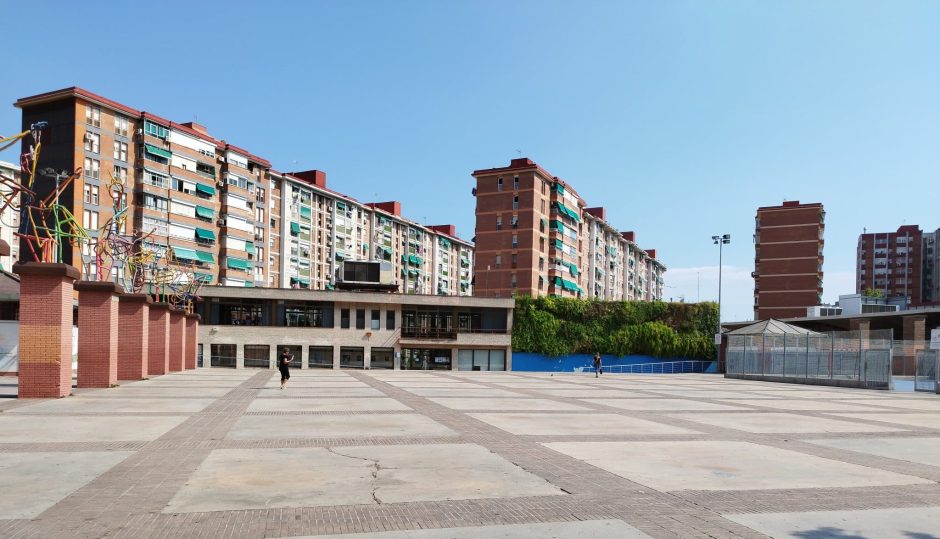
A square in Cornella de Llobregat
Lisbon, Portugal – Enhancing the Walkability.App
Promoting walking across Lisbon’s hilly landscape aligns with Portugal’s National Strategy for Active Pedestrian Mobility 2030. However, successful implementation requires scalable data on pedestrian habits and their walking environment. The Walkability.App, designed by Walk21 Foundation, addresses this need and enables pedestrians to share experiences and inform new improvements. With the awarded grant, Lisbon plans to enhance the app with locals in mind, supporting its commitment to increase walking and halve emissions by 2030.
The first phase focuses on improving the functionality of the app, including GDPR compliance and enabling citizens to attach images. The second phase involves conducting participatory walking assessments to identify areas requiring improvement for pedestrians followed by evaluation, analysis of the lessons learned and an assessment of its replication potential.
Data collection on the experience of walking is essential for our understanding of the citizen pedestrian needs, developing the best policies and evaluating measures. This project will give us the opportunity to create better information and processes for transforming Lisbon into a city of excellence for walking.
–Ângelo Pereira, Lisbon’s Deputy Mayor for Pedestrian Accessibility
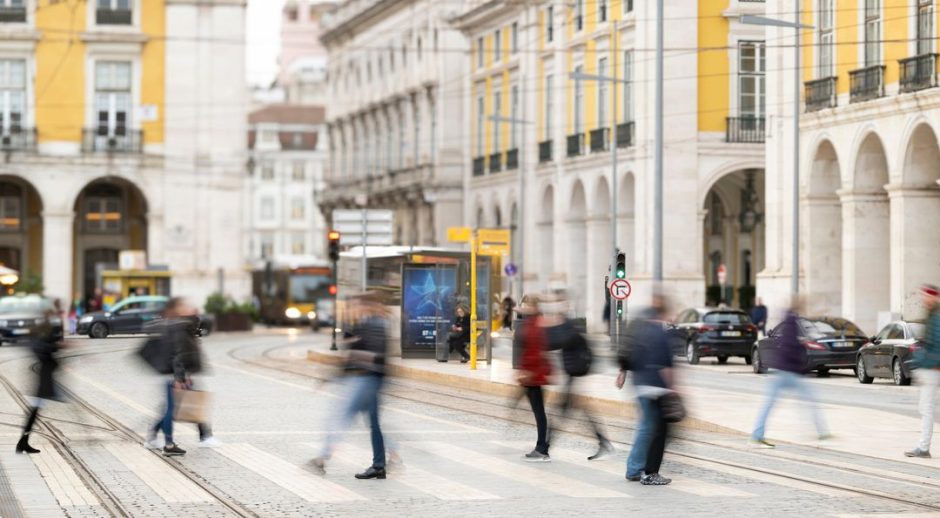
Pedestrians in Lisbon, Portugal
Liverpool, UK – The Greening Liverpool Project: Transforming urban spaces with sustainable solutions
Liverpool City Council faces urban challenges exacerbated by climate change, including poor air quality, low biodiversity, and surface water flooding. Despite efforts to promote active travel, only 2 per cent of journeys in the region are made by bike or foot. contributing to carbon emissions and congestion. Recognising the need to slash carbon emissions and congestion, the Council declared a Climate Emergency in 2019.
Leveraging expertise gained from previous EU-funded projects, such as the URBAN GreenUP project, the Greening Liverpool Project aims to deliver innovative, nature-based solutions to improve the local environment and encourage walking, cycling and wheeling. The proposal includes installing trellis planters on Grafton Street, planting native hedges at Saint Brides Church, introducing permeable paving on Kent and Upper Pitt Streets, and upgrading paths, cycling lanes, and native planting in Dingle’s Hill Street.
Liverpool prides itself on innovation and we’re also looking at new ways to deliver greener methods in highways construction, so sustainability is rooted in everything we do from the materials in our roads to how people travel on them.
–Andy Mollon, Director of Transportation and Highways at Liverpool City Council
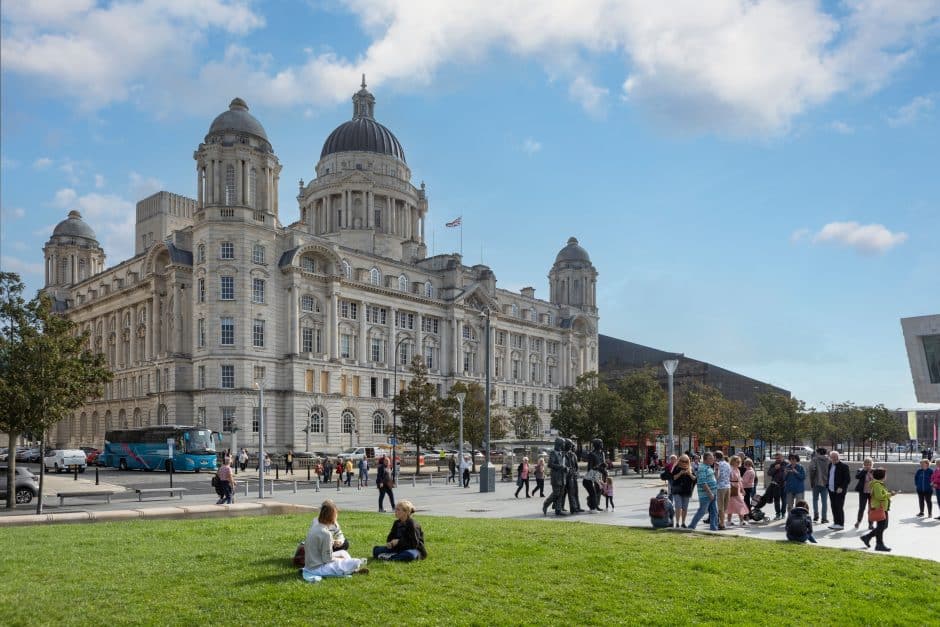
Citizens outside the Port of Liverpool
Santa Coloma de Gramenet, Spain – The Cycling Promotion Lab
In the metropolitan region of Barcelona, 93 per cent of all journeys cover less than ten kilometres, making bicycles (and e-bikes) a sustainable alternative to cars. This community-driven initiative in the northeastern part of the city aims to increase cycling participation among residents, particularly women and children. By establishing a dedicated ‘Cycling Promotion Lab,’ the project will implement practical initiatives to improve access, skills, and confidence in cycling.
With a focus on engaging directly with 300 participants and reaching about 3,000 individuals, this project aims to make cycling more attractive, accessible and inclusive for all residents of Santa Coloma, but especially women and children. Through hands-on training, the project aims to foster a culture where inner-city cycling is seen as a convenient mode of transportation.
Santa Coloma supports the Cycling Lab project with the aim of promoting and empowering more people, especially mothers and children, to use bicycles as a means of sustainable, environmentally friendly transport and improving the health, quality of life and autonomy of citizens. This exemplifies our strong commitment to creating a model city that is equal, sustainable and safe, and one that is firmly dedicated to addressing the effects of the climate crisis.
–Núria Parlón, Mayor of Santa Coloma de Gramenet
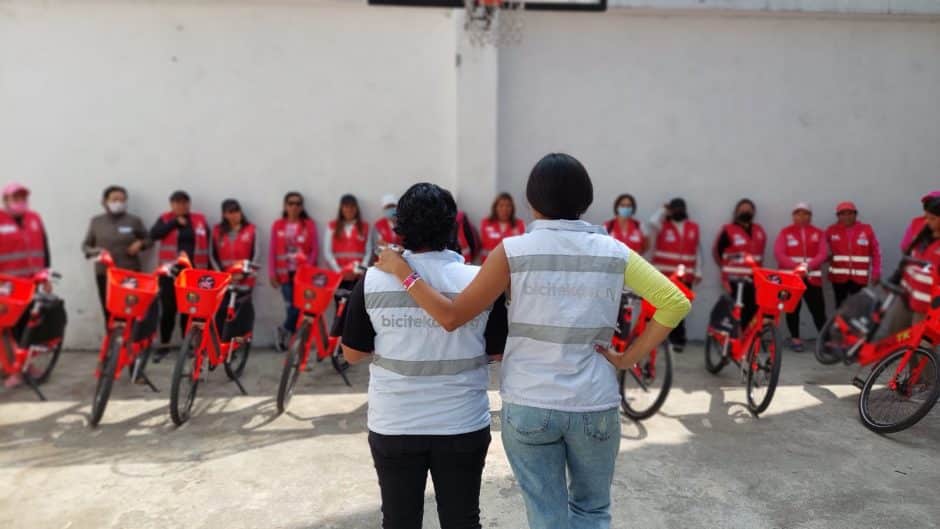
Women-led bicycling training in Santa Coloma
Utrecht, The Netherlands – Transforming Car Parking Spaces: A Pop-Up Public Space Project
Utecht’s project proposes temporary pop-up elements in public spaces, with a particular focus on reimagining car parking spaces to advocate for sustainable urban design. By temporarily repurposing these spaces into green areas, bicycle parking zones, and gathering spots, the project will spark conversations about redefining public space and reducing car dominance in urban environments.
Aligned with Utrecht’s Spatial Strategy 2040, the project aims to increase greenery and prioritise people and more sustainable mobility over motor vehicles. The greater goal is to encourage alternative transportation modes and community interaction, and demonstrate the potential for long-lasting changes in urban planning which reclaim space for both citizens and nature.
By prioritising greenery and community spaces over car dominance, we’re reimagining the future of the city, fostering a healthier environment, and creating spaces that truly serve the needs of our residents and promote a sense of belonging.
–Councillor Linda Voortman of Utrecht
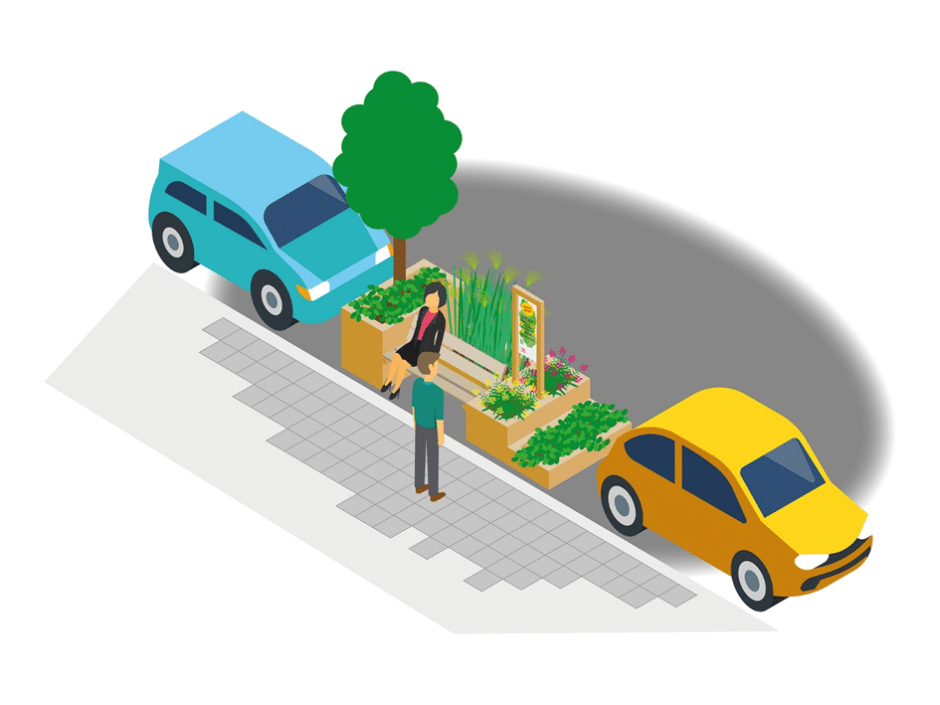
An illustration of a parking space pop-up in Utrecht
The future of urban transport
Since its launch in 2022, the Sustainable Cities Mobility Challenge has provided $640,000 in funding to support nine European cities across six countries. This funding was made possible through the Charities Aid Foundation (CAF) America, utilising a grant from FedEx. This month, a third tranche of funding was approved for the Challenge, enabling us to support another four to five municipalities in the future. We expect to run a call for expressions of interest in early 2025.
Our collaboration with FedEx illustrates the potential of public-private partnerships when corporations, city officials, and citizens unite for a common goal. The multi-year success of the Challenge highlights the transformative power of these collaborations in reimagining how we move within our cities.
This article is part of EIT Climate-KIC’s #LiveableCities Campaign, where we explore the pathways to a climate neutral, just, and more beautiful future. By 2030, our goal is to help transform over 400 cities into thriving, climate-resilient communities. This campaign captures the stories and lessons of ambitious cities in Europe and around the world. We want to show a vision of what’s possible when cities and stakeholders come together to tackle the climate crisis.
Related Goal
Goal 3: Accelerate clean urban mobility






